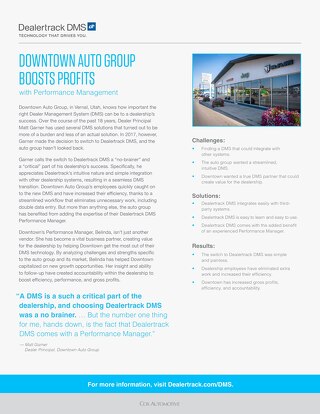I’ve had the privilege to listen to Dealer Advisory Boards and other groups who share their feedback on the technology used to run their business in my career, and often, it’s not always good. It’s not always bad, however. In the last year, despite an economic downturn, the car buying process has largely improved. With the rapid rise of online shopping, buyer satisfaction rates are up, year-over-year, to 72%. That’s remarkable.
It’s exciting when new technology helps your customers find what they’re looking for faster. Everyone is happier. Business gets better. But, without a partner in your corner, reaching profitability becomes a constant struggle. Dealers often view their DMS as a utility. I’m here to tell you that your DMS, in most cases, is an untapped resource. With the rapid rise of digital technology, process, and data, having the right DMS partner is a crucial component of maximizing your profit potential.
No Slowing Down
For the most part, dealers don’t see their Dealer Management technology as a profit-driver. A DMS is required to function. Your DMS holds much of the data required to run payroll, for example. But it’s critical to the profitability of today’s new digitized landscape. For one thing, dealers are scaling up their technology like never before, and they’re not slowing down. According to a report, 84% of franchise dealers expect to increase sales in 2021. With so much rich data being delivered to all the major departments of your business, a DMS that could leverage the right data, at the right time, would set up any dealer for success. (And a failure to do so would lead to the opposite.)
A DMS Partner (Not a Vendor)
If you happened to catch Tracy Fred, Vice President of Dealer Sales and Service Solutions for Cox Automotive in this recent interview, she put it bluntly. “With the convergence of technology, processes and data, dealers are left to figure it out on their own in most cases. It’s difficult to do that in a silo,” she said. I agree.
The more data that flows through your auto group, the better. Right? Not necessarily. Better insights into the data you collect, combined with newer processes to improve the way your team operates are key. But, there’s still a piece missing. As Tracy Fred points out, “You need people who can help you connect those three things. That’s why Dealertrack has a team of Performance Managers.” That’s where my team comes in.
With a minimum of ten years of dealer management experience, a Performance Manager is a dedicated resource who ensures that our partners are leveraging the software we supply to its fullest potential. Training, reporting, goal-setting and analytics are also part of the role. It’s not a sales position, it’s a business partner who ensures your dealership performs with the tools we provide.
Efficiency is Key
More of the buying process has moved online. But the idea that buyers are forgoing any interaction with your sales team is sort of a misunderstanding. While it’s true that heavy digital users have reduced their time at the dealership by up to 40 minutes, in one report, they still visit. Some interactions will be 100% virtual. Others will take place in the showroom or the service center. Optimizing efficiency is key. And the way to do that is by streamlining your workflows, reducing the friction points your staff encounters when switching from disparate software systems that enable transactions and when pulling valuable data.
Change Management Partners
New technology and software can be disruptive to your staff’s workflows upon installation. In fact, Change Management is one of the top fears holding dealers back when considering a technology switch. The dealer principal owners I’ve worked with almost always have a few key “champions” within their auto group willing to embrace new technology…and also one or two detractors who are less than excited. When choosing a new technology vendor, it’s important to find a partner willing to take some of that burden off of your plate. Again, the Performance Managers can help get every staff member on-track, from each location, so that each of your locations is functioning on the same level upon launch.
Ongoing Support
Signing a new partner and launching a new DMS is a big endeavor. But, dealership staff tends to turnover frequently. So what are dealers supposed to do each time they bring new hires onboard and their vendors are long gone? In general, dealers do a good job of hiring the right staff. Your sales managers and service pros already know how to do their jobs (or you wouldn’t have hired them). But if your technology stands in the way of letting them get to work, then it’s on us to bring them up-to-speed. If you don’t have a partner who is staffed and dedicated to training your team—and fast—then you might want to reconsider your contract. Technology changes constantly, and it’s on us to ensure our dealer partners are getting the most out of their tools.
Finally, Is Your Tech Helping or Hindering Sales?
Ultimately, the technology driving your data should deliver better business decisions. It should reduce backlogs of old data, manual re-entry, and clumsy reporting that hinders your operations. And, it should drive profitability. If it isn’t helping you make more money, it’s helping you lose money. Having a business partner with real dealership experience, who can hold your team to critical reporting and key metrics that deliver results, while keeping your staff up-to-speed is more than just a utility. It’s a partnership.
Discover more insights and recent trends in Randy’s upcoming webinar, 6 Ways Your DMS Can Maximize Your Profit Potential. Registration is open now—Sign Up Today.
















